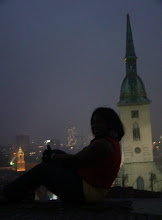Watching the first 15 minutes of Aladdin with a critical eye was an experience of revelation. Minute details that had been overlooked through the eyes of childhood, stereotypes of the Arab person that are rampant throughout the film, or even the lyrics to the beginning song "its barbaric but hey, it's home". All these things that i was now questioning and looking at, make me go back to Sahid's theory of Orientalism as a western method of institutionalizing the middle east as a way of controlling it.
I mean, Aladdin begins with a shifty looking Arabic merchant who is trying to swindle you into buying his wares, some of which are broken such as the hookah/coffee maker combo. Just from that intro, has the middle eastern man not already been depicted as untrustworthy and conniving? In this case, millions of Americans and people across the world who have watched Aladdin and those who will buy the DVD for their "little princesses" will be viewing the institutionalizing of the Arab man as an unscrupulous and manipulating businessman who preys on the unaware. With this perspective, would it not therefore be right to side with Sahid in saying that the Western world has tried from all sides to denounce and denigrate the middle eastern, thereby controlling the world's perception of it.
Going on the idea of image, is it not curious that the characters in Aladdin are all bearing the stereotypical strong features of a middle eastern person. From the big noses, to the dark skin to gruffness of nature, the characters around Aladdin are definitely what one expects the middle east person to look like. Then comes young Aladdin, a diamond in the rough as the movies says, skin a tad lighter than everyone else, angular nose and facial features that are a direct product of the west. You have to love him and his clever ways of outwitting and escaping the cruel guards/police who seek to capture him for stealing. Never mind that these police keep screaming at Aladdin how they desire to chop his head off and all sorts of dire demises (which brings to mind how bloodthirsty and errational their conception of juctice is). So looking at these scenes, one is given images that associate goodness with the western looking Aladdin while greed, cruelty and bloodthirstiness belongs to the middle east.
But one cannot ommit the other misrepresentation of the middle east that the movie Aladdin perpetuates. Remember when Aladdin first encounters the prince who is coming to court Princess Jasmine? Then when she faces off with her father about not wanting to be forced to marry? Yes, therein in these conversation is the misrepresentaion of the middle eastern leader. You have the prince who callously would have trod upon the little child in his path, then jeers at Aladdin about how he is a nobody and the fleas on his head are the only ones who would mourn him. Then you have the rotund, almost inept king and father to Jasmine, who is easily misled and controlled by his advisor, Jafar. Then there is Jafar himself, manipulative, power hungry and evil. These are three examples of the people in leadership that one sees in the first 15mins of Aladdin. Judging from this depiction of middle eastern leaders, is it not fair to assume that leaders in that part of the world are either corrupt and self serving, narcisistic and self-important or weak and inept? That is assuming that Aladdin's depiction is true. If not, then how can this tarring of a people's image through popular media such as movies, be justified?
Some would say the same of many other fairy tales or movie productions out there, but i would maintain that it doesn't matter whether misrepresentations have been made by other people, it does not take away from those that are being made in this movie. Enjoyable as i may think Aladdin is, it still does not plant positive images of the people that it depicts or even of their culture.
http://www.youtube.com/watch?v=WuhG-m4MC8k&feature=related
Subscribe to:
Post Comments (Atom)

Wow, this was a really interesting view on Alldain. I will have to go back and critically view this animation. I think that it was a really good insight to better understanding Middle Eastern culture. I guess misinterpertations of cultures through films are offten the case and as students we need to be more analytical with our materials.
ReplyDeletewonderfully commented on alladin in perspective of postcolonial readings
ReplyDelete